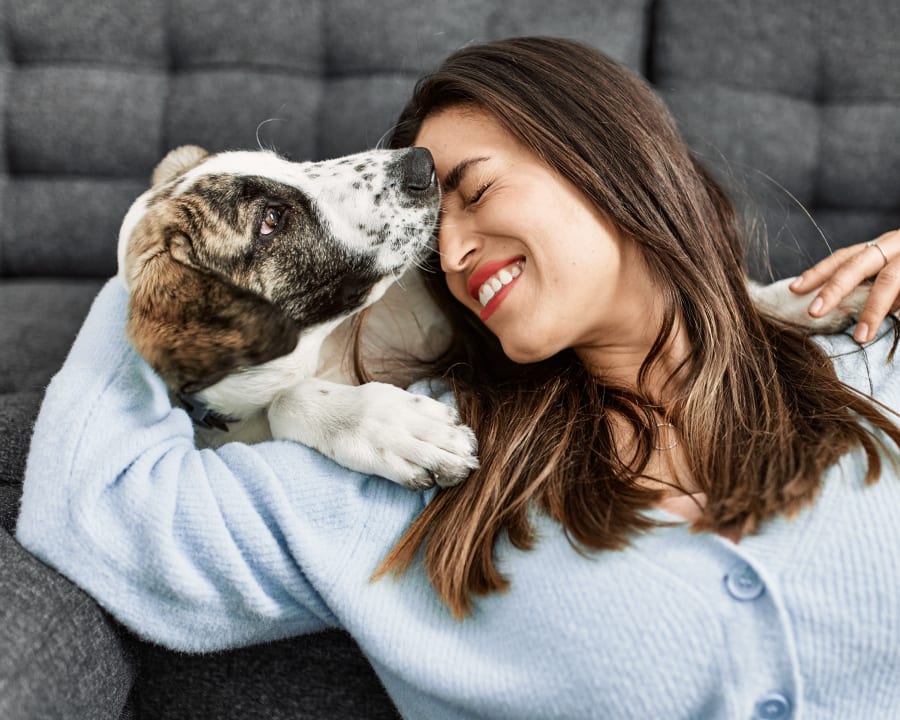Senior Care for Pets
Proactive Care for Senior Dogs & Cats
Maintaining optimal health, good quality of life, and comfortable mobility are three top priorities when it comes to caring for senior cats and dogs. This is why routine preventive care and early diagnosis of developing health conditions are essential as they age.
Diligent care can help extend their life and good health throughout their senior years, so it's important that they attend regularly scheduled wellness exams, even if they appear healthy.
Our veterinarians can help your aging furry friend achieve optimal health by identifying and treating emerging health issues early, and providing proactive treatment in the early stages when health conditions are most easily managed.

Health Problems in Senior Cats & Dogs
Improvements in nutrition and advances in veterinary science mean that our cherished dogs and cats are enjoying increased longevity, living much longer than in the past.
However, elderly pets are commonly affected by a number of medical conditions, including:
-
Joint or Bone Disorders
Senior Dogs
As your dog reaches their golden years, there are a number of joint or bone disorders that can result in pain and discomfort.
Addressing these issues early is essential for keeping your four-legged friend comfortable as they continue to age. Treatment for joint and bone issues in senior dogs ranges from simply reducing levels of exercise, to the use of analgesics and anti-inflammatory drugs, to surgery to remove diseased tissue, stabilize joints or reduce pain.
Senior Cats
While osteoarthritis is typically a condition we think of in older dogs, this painful condition can also affect your cat's joints.
Symptoms of osteoarthritis in cats are more subtle than those in dogs. While cats can experience a decrease in range of motion the most common symptoms of osteoarthritis in aging cats include weight loss, loss of appetite, depression, change in general attitude, poor grooming habits, urination or defecation outside the litter pan, and inability to jump on and off objects. Lameness typically seen in dogs is not commonly reported by cat owners.
-
Cancer
Bringing your aging four-legged friend in for routine checkups even when they seem healthy allows your veterinarian to examine them for early signs of cancer and other developing conditions, which respond better to treatment when caught in their earliest stages.
-
Heart Disease
Heart disease can be a problem for dogs and cats as they get older.
Senior dogs often develop conditions such as congestive heart failure.
Heart disease is seen less in cats; however, Feline Hypertrophic Cardiomyopathy (HCM) is relatively common.
-
Blindness & Hearing Loss
Degeneration in the eyes and ears can lead to varying degrees of blindness and deafness in older companions, particularly dogs.
These conditions often come on slowly, allowing senior cats and dogs to adjust their behaviour and making it difficult for their owners to notice.
-
Liver Disease
Liver disease is common in elderly cats and may be the result of high blood pressure or hyperthyroidism. Signs of liver disease in cats include loss of appetite, jaundice, drooling, vomiting, diarrhea, and increased thirst.
In dogs, signs such as seizures, vomiting, diarrhea, fever, jaundice, abdominal fluid buildup, and weight loss can be a sign of liver disease.
If your pet is displaying any signs of liver disease, veterinary care is essential.
-
Diabetes
Although dogs and cats can develop diabetes at any age, most are diagnosed as they pass middle age.
Symptoms of diabetes in dogs and cats include excessive thirst, increased appetite accompanied by weight loss, cloudy eyes, and chronic or recurring infections.
-
Kidney Disease
Kidney function tends to decline as our four-legged friends age. That said, in some cases medications used to treat other conditions in senior dogs and cats can lead to kidney problems.
While chronic kidney disease cannot be cured, it can often be managed with a prescription diet and medications.
-
Urinary Tract & Bladder Issues
Elderly dogs and cats can be prone to accidents as the muscles controlling the bladder begin to weaken.
Incontinence can be a sign of a bigger health issue such as a urinary tract infection or dementia and should never be ignored.
If your senior furry family member experiences incontinence issues, make an appointment to have them seen by a veterinarian as soon as possible.
What to Expect at a Senior Pet Exam
During the physical exam, your veterinarian will check for any signs of health problems by examining your pet's teeth and mouth, listening to their heart and lungs, assessing joint movement, and inspecting the abdomen, eyes, nose, ears, fur, and skin.
We may also recommend diagnostic tests such as a complete blood count (CBC), biochemistry profile, and urinalysis to evaluate the function of internal systems and identify any potential health issues.
Based on the exam and test results, we'll develop a treatment plan to address existing health concerns and prevent age-related problems. This might include changes to diet or exercise, medications, and supportive therapies like cold laser therapy.
New Patients Welcome
Breadner Veterinary Services is accepting new patients! Our Saanichton veterinarians are passionate about the health of your pet and are here to serve you six days a week. Get in touch to book your companion's first appointment.
Contact
Hours
-
Click to View
- Monday:08:00 am - 05:30 pm
- Tuesday:08:00 am - 05:30 pm
- Wednesday:08:00 am - 05:30 pm
- Thursday:08:00 am - 05:30 pm
- Friday:08:00 am - 05:30 pm
- Saturday:09:00 am - 04:00 pm
- Sunday:Closed
